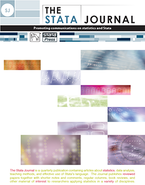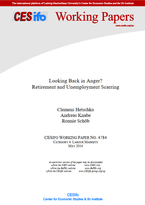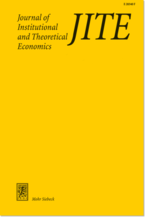New Publications
The Stata Journal: "Simulated multivariate random-effects probit models for unbalanced panels"
New publication by Alexander Plum:
|
This article develops a method for implementing a simulated multivariate random-effects probit model for unbalanced panels (with gaps) and illustrates the model by using artificial data. Halton draws generated by mdraws are used to simulate multivariate normal probabilities with the mvnp() egen function. The estimator can be easily adjusted, for example, to allow for autocorrelated errors. The advantages of this simulated estimation, when compared with existing commands such as redpace, are high accuracy and improved stability. The publication can be found here. |
 |
CESifo Working Papers: "Looking Back in Anger? Retirement and Unemployment Scarring"
New discussion paper by Andreas Knabe, Clemens Hetschko and Ronnie Schöb:
|
In a new discussion paper, Andreas Knabe (together with Clemens Hetschko and Ronnie Schöb, Freie Universität Berlin) examines whether unemployment leads to long-lasting losses in life satisfaction even after becoming reemployed that are not related to income losses (scarring effects). By examining the transition of unemployed persons to retirement, it is possible to separate the scars caused by future labor market uncertainty from genuine scars purely related to past experiences. The study finds evidence for such genuine unemployment scars for people who were unemployed for the first time in their life directly prior to retirement, but not for people with earlier unemployment experiences.
The discussion paper can be found here. |
 |
Oxford Economic Papers: "Subsidizing extra jobs: promoting employment by taming the unions"
New publication by Andreas Knabe and Ronnie Schöb:
|
Wage subsidies can help to create employment and reduce unemployment by lowering labor costs and increasing labor demand. A problem of wage subsidies is, however, that they might give rise to higher wage claims by labor unions. The resulting increase in labor costs would reduce the initially positive employment effect of the wage subsidies. In a recent research article, Andreas Knabe and Ronnie Schöb (FU Berlin) show that the shifting of the subsidy into higher wages can be reduced if the subsidy is granted only for marginal, i.e. additional, employment. With this restriction, the employment-creation effect of wage subsidies can be maintained. The publication can be found here. |
 |
Kyklos: "Right-Wing Extremism and the Well-Being of Immigrants"
New publication by Andreas Knabe, Steffen Rätzel and Stephan L. Thomsen:
|
Migrants in Germany suffer from a substantially lower life satisfaction when they live in regions where the native population has xenophobic or racist attitudes. This negative effect is even stronger for highly qualified migrants. As a result, migrants report to be less willing to stay in Germany. These findings were obtained in a recent study by Andreas Knabe, jointly written with Steffen Rätzel (formerly OVGU) and Stephan Thomsen (NIW Hannover). If Germany needs more skilled migrants to deal with the challenges of demographic change, which requires raising the attractiveness of Germany as an immigration country, this study suggests that it is important to reduce xenophobia among the native population and to promote a „culture of welcome“. The publication can be found here. |
 |
JITE: "Spillover Effects of Minimum Wages under Union Wage Bargaining"
New publication by Marcus Dittrich and Andreas Knabe:
|
Empirical and experimental research suggests that minimum wages cause spillovers to wages higher up in the wage distribution, i.e., they may even raise wages that were already above the new minimum wage. In this paper, we analyze how these findings can be explained by theoretical wage bargaining models between unions and firms. While the Nash bargaining solution is unaffected by minimum wages below initially bargained wages, we show that such minimum wages can drive up wages - and be harmful to employment - when bargaining follows the Kalai-Smorodinsky solution. The publication can be found here. |
 |